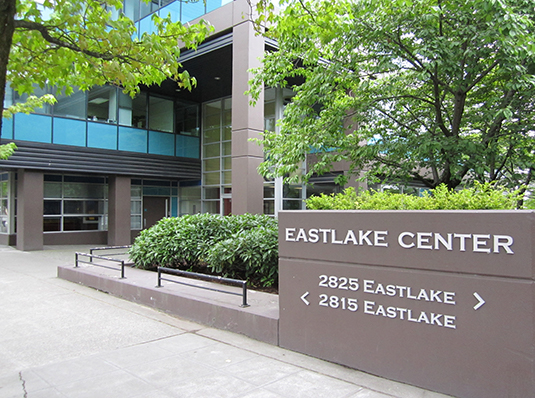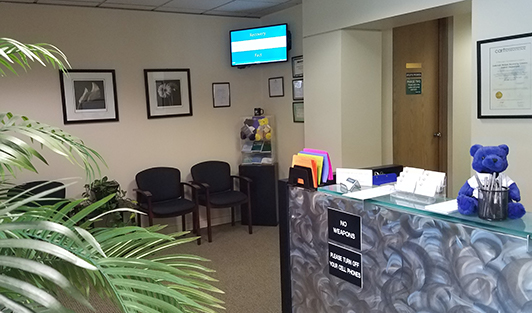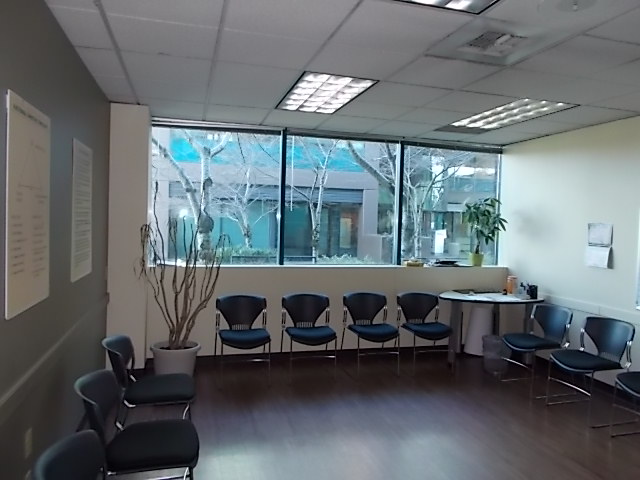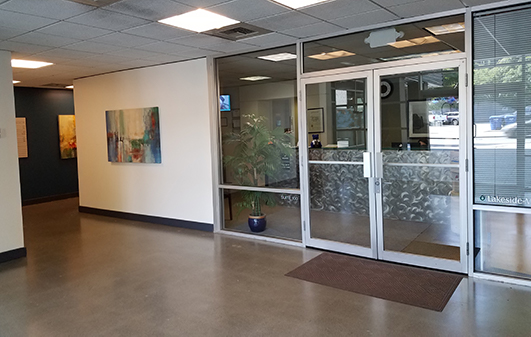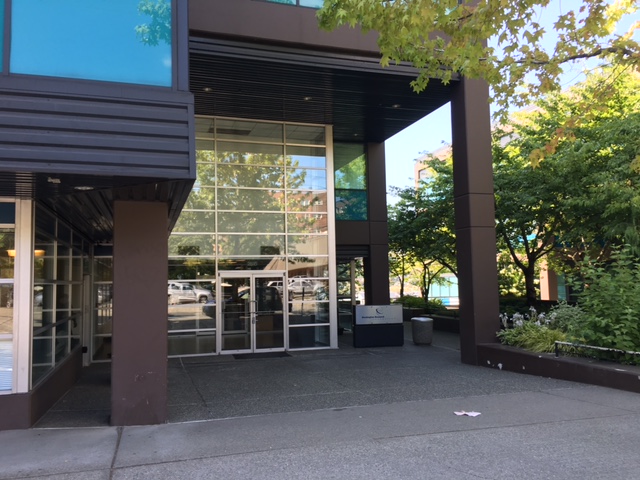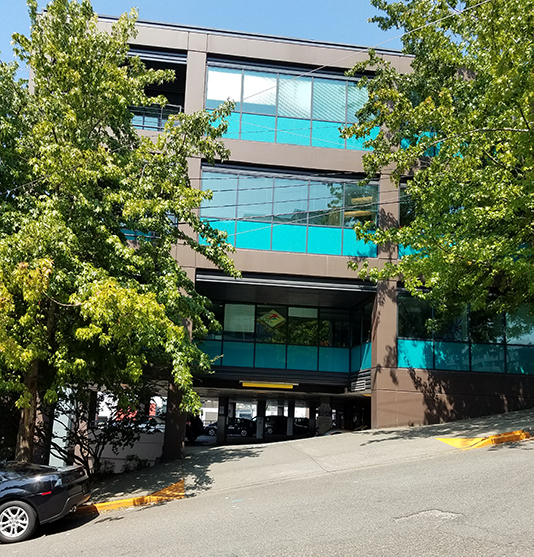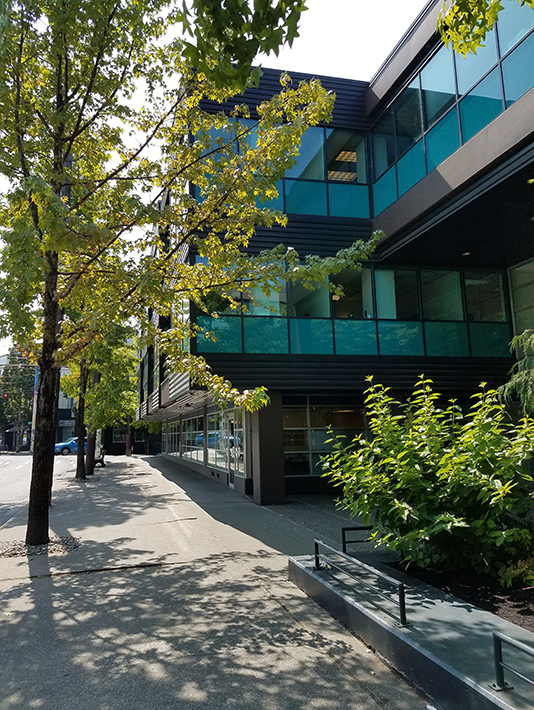Lakeside Milam - Eastlake
Overview
Founded in 1983, Lakeside-Milam Recovery Center operates multiple facilities, including this facility in located in Seattle, Washington. This facility provides a comprehensive range of programs for the treatment of alcohol and drug addiction in adults. The center offers a full continuum of care, encompassing detoxification, residential and inpatient treatment, outpatient programs, and virtual outpatient services.
The Intensive Outpatient Program (IOP) at Lakeside-Milam Recovery Center features group therapy sessions, individual counseling, and case management, all designed to assist individuals throughout their recovery journey. The center recognizes the profound impact of addiction on both the individual and their family, and therefore places a strong emphasis on family involvement. It offers family counseling and educational sessions to enhance understanding of addiction and to support families in their loved ones' recovery.
Lakeside-Milam Recovery Center is accredited by the Commission on Accreditation of Rehabilitation Facilities (CARF). This accreditation confirms that the center adheres to stringent standards of care and service delivery, underscoring its commitment to providing high-quality, effective treatment and support for individuals and families affected by addiction.
Lakeside Milam - Eastlake at a Glance
Payment Options
- Cash or self-payment
- Private health insurance
- Federal military insurance (e.g., TRICARE)
- Daily
- 90 day cost
Assessments
- Comprehensive mental health assessment
- Comprehensive substance use assessment
- Interim services for clients
- Screening for mental disorders
- Screening for substance use
Age Groups
- Young adults
- Adults
- Adolescents
Ancillary Services
- Case management service
- Suicide prevention services
- Mental health services
Accreditations
State department of health:

State Licenses, issued by government agencies, authorize rehabilitation organizations to legally operate within designated geographical areas. The specific licenses required for operation are typically determined by both the nature of the rehabilitation program provided by the facility and its physical location.
Commission on Accreditation of Rehabilitation Facilities (CARF):

CARF accreditation is a globally recognized certification for rehabilitation and human service organizations. It signifies that an organization meets high-quality standards and is committed to providing top-level care. Achieving CARF accreditation involves a rigorous evaluation process, including on-site surveys. This accreditation enhances an organization's reputation, instills trust in clients and funders, and encourages ongoing excellence in the field.
NAATP:

Established in 1978, the National Association of Addiction Treatment Providers (NAATP) is a professional organization dedicated to advocating for and representing entities involved in addiction services. NAATP is committed to advancing the field of addiction services and ensuring that top-tier addiction treatment remains both accessible and widely available.
Treatment At Lakeside Milam - Eastlake

Conditions Treated
Alcoholism:
Alcohol addiction is a health problem where drinking takes control over a person's life. It affects how their brain thinks and acts, leading to strong desires to drink, bad feelings, sudden actions, and discomfort when not drinking. To help someone with this problem, there are treatments like detox, counseling, group support, and learning coping methods. While treatment can't completely cure the urge to drink, it helps people regain control of their lives and feel better overall.
Substance use treatment:
Substance use rehabilitation is a structured program aimed at assisting individuals in overcoming their dependencies on drugs or alcohol. Through a combination of medical detoxification, counseling, and various therapeutic approaches, these programs strive to address the physical and psychological aspects of addiction. The goal is to equip individuals with the knowledge, skills, and support necessary to attain lasting sobriety, while also working to identify and address the underlying issues contributing to substance misuse. By fostering a supportive environment, substance use rehabilitation centers provide a pathway towards a healthier, substance-free life.
Mental health treatment:
Mental health treatment involves a range of therapeutic approaches, provided by licensed professionals, to address mental health challenges. It includes psychotherapy, medication, and holistic practices to help individuals manage conditions, improve coping skills, and enhance overall well-being. The goal is to empower individuals to lead fulfilling lives and reduce the stigma surrounding mental health.
Co-occurring Disorders:
Dual-diagnosis rehabilitation centers specialize in the treatment of individuals who suffer from a co-occurring mental health disorder and a substance use disorder. This complex interplay between addiction and mental health can make recovery more challenging, as each condition may exacerbate the symptoms of the other. Dual-diagnosis rehabilitation centers offer an integrated approach that addresses both issues simultaneously and often includes a comprehensive assessment for an Integrated Treatment Approach through Holistic Therapies, including family therapy and aftercare treatment.
Opioid Treatement:
Opioid addiction rehabilitation is a specialized treatment process tailored to address the unique challenges and complexities of opioid dependence, including drugs like heroin and prescriptions like oxycodone. The process typically begins with a medical detox to ease withdrawal symptoms, followed by therapeutic interventions to address the root causes of addiction. This holistic approach aims to provide individuals with the skills and support needed for long-term recovery from opioid use.

Levels Of Care
Outpatient:
Outpatient treatment in a rehab center offers structured therapeutic services for individuals seeking recovery without full-time residential admission. Unlike intensive outpatient programs, which demand more frequent and longer sessions, standard outpatient care provides a more flexible approach, allowing participants to maintain daily activities and responsibilities while undergoing treatment.
Intensive outpatient treatment:
Intensive Outpatient (IOP) is a specialized level of care aimed at assisting those on their recovery journey from addictions or mental health disorders. Unlike the inpatient or residential treatments where attendees reside within the facility, IOP offers a robust therapeutic experience while enabling participants to stay home and continue their daily routines. Generally, individuals in IOP engage in several sessions weekly, clocking in at around 9-20 hours or even more. These sessions encompass individual counseling, group sessions, familial guidance, and instructional classes that equip attendees with the tools and methods to manage symptoms and avert relapses.
Regular outpatient treatment:
Regular Outpatient Treatment typically involves scheduled therapy sessions that occur on a part-time basis, allowing individuals to receive the necessary support and guidance while maintaining their daily routines. These outpatient sessions are generally held multiple times a week, with the exact frequency tailored to the individual's needs and progress. The number of sessions per week can vary, but it commonly ranges from two to five sessions, providing a flexible and effective approach to addiction recovery and mental health treatment.
Aftercare:
Aftercare refers to the structured support and programs offered to individuals after completing an initial treatment phase for substance abuse or other disorders. Recognizing that recovery is an ongoing process, aftercare provides continued counseling, skill-building, group therapy, and resources to help individuals maintain sobriety, manage triggers, and reintegrate into daily life, reducing the risk of relapse and ensuring long-term success in recovery.
Outpatient detoxification:
Outpatient Detoxification refers to a medical process where individuals with substance dependence are systematically and safely withdrawn from those substances under medical supervision, while not being admitted to a hospital or inpatient facility. This approach allows patients to detoxify from drugs or alcohol in a less restrictive environment, often enabling them to maintain certain daily responsibilities such as work or family commitments. Close monitoring, medications, counseling, and support are provided to manage withdrawal symptoms and prevent complications.

Treatment Modalities
Cognitive behavioral therapy:
Cognitive Behavioral Therapy (CBT) is a widely practiced form of psychotherapy that seeks to address dysfunctional emotions, behaviors, and thoughts through a goal-oriented, systematic process. It encourages individuals to challenge distorted cognitions and change destructive patterns of behavior by promoting self-awareness and effective coping strategies. CBT is often used to treat a range of disorders including anxiety, depression, and stress, making it a versatile and practical therapeutic approach. Through enhancing an individual's capacity to manage life's challenges, CBT contributes to improved mental well-being and overall quality of life.
Telemedicine/telehealth therapy:
Telehealth Therapy is a remote care option that allows individuals to access mental health services via digital technology, such as secure video conferencing. This mode enables patients to engage with therapists from their homes, offering flexibility and overcoming geographical limitations. Ideal for those in rural areas, with mobility issues, or tight schedules, Telehealth Therapy ensures quality mental health support is always within reach.
Substance use disorder counseling:
Substance use disorder counseling treatment modalities refer to various approaches and methods used in the counseling and treatment of individuals with substance use problems. This can include individual therapy, group therapy, cognitive behavioral therapy, motivational interviewing, family therapy, and 12-step programs. The goal is to help the individual overcome their substance use, develop healthy coping skills, and lead a fulfilling life in recovery.
Trauma-related counseling:
Trauma-related counseling addresses the deeply rooted psychological wounds and distress that often coexist with substance use disorders. Recognizing that past traumatic experiences can play a significant role in the onset and persistence of addiction, this therapeutic approach aims to help individuals understand and process their trauma, develop coping skills, and work towards healing. Individuals are better equipped to achieve long-term recovery and improved mental well-being by simultaneously addressing both trauma and addiction.
Group counseling:
Group counseling provides a supportive environment where individuals share personal experiences and insights, under the guidance of a professional counselor. It facilitates self-awareness, fosters interpersonal learning, and helps members work through personal and relational challenges. Through shared dialogue and reflection, individuals learn coping strategies, gain emotional support, and experience personal growth within a communal setting.
Family counseling:
Family Counseling is a therapeutic approach that seeks to address and improve communication, understanding, and dynamics within a family unit. By addressing conflicts, emotional distress, and behavioral challenges, a trained therapist provides guidance and tools for family members to strengthen bonds, resolve issues, and foster a healthier family environment.
12-step facilitation:
Recovery models grounded in 12-step programs prominently incorporate peer coaching, strongly emphasizing personal growth as the pathway to enduring sobriety. Regular participation in 12-step meetings, known for their anonymity, cost-free access, and daily availability, is encouraged. The 12 steps of recovery, anchored in spiritual principles, guide participants in unraveling the core issues of their addiction, taking accountability for their decisions, and coming to terms with aspects beyond their control. Chosen by the individuals themselves, sponsors offer personalized one-on-one mentorship, aiding in navigating through the recovery journey.
Intervention Services:
Intervention is a set of structured processes or strategies designed to assist individuals in recognizing and addressing problematic behaviors, such as substance abuse, addiction, or mental health issues. These services typically involve a team of professionals or trained individuals who work collaboratively to guide and support the person in need and their loved ones, aiming to facilitate a pathway to recovery or appropriate treatment.
Motivational interviewing:
Motivational Interviewing (MI) is a client-centered therapeutic approach that fosters behavioral change by assisting individuals in exploring and resolving ambivalence. Specifically tailored for addiction treatment, MI helps clients unearth their own motivations to quit substance use and empowers them to take the lead in their recovery journey. Therapists guide clients toward their goals and self-determined pathways to sobriety through empathetic conversation and skillful questioning.
Anger management:
"Anger Management" refers to a set of techniques and strategies designed to help individuals recognize and control their anger. Through a combination of cognitive behavioral therapy, self-awareness exercises, and coping mechanisms, individuals can better understand the triggers and reactions associated with their anger, ensuring they respond more positively and constructively. Effective anger management prevents potential conflicts and outbursts and promotes healthier relationships and emotional well-being.
Relapse prevention:
The Relapse Prevention Model is a cognitive-behavioral approach designed to teach individuals who are trying to maintain behavioral changes (like sobriety from drugs or alcohol) how to anticipate and cope with the potential for relapse. The model emphasizes the importance of understanding the processes and triggers that lead to relapse, developing strategies to prevent initial lapse, and minimizing the severity and duration if a lapse occurs. It's grounded in the belief that relapses can be viewed as learning opportunities, helping individuals strengthen their commitment and skills to avoid future setbacks.
Holistic Treatment:
Holistic treatment in a rehab center encompasses a comprehensive approach to recovery, addressing an individual's physical, emotional, mental, and spiritual needs. Rather than focusing solely on the symptoms of addiction, this method seeks to treat the underlying causes and imbalances that contribute to substance abuse. Incorporating a variety of therapies, such as meditation, yoga, acupuncture, and nutritional counseling, holistic treatment aims to heal the whole person, ensuring a well-rounded and sustainable recovery journey.
Individual psychotherapy:
Individual Psychotherapy is a personalized therapeutic approach aimed at aiding individuals in overcoming addiction and its underlying psychological triggers. A licensed therapist works closely with the individual through one-on-one sessions to unearth and address personal challenges, emotional issues, and behavioral patterns contributing to their substance abuse. Individual psychotherapy lays a robust foundation for a sustainable recovery and a better quality of life by fostering self-awareness, coping strategies, and healthier behavioral responses.
Life Skills:
Life skills refer to a vital component of rehabilitation that focuses on equipping individuals with the essential abilities and strategies necessary to lead a fulfilling and substance-free life. These skills encompass a wide range of practical tools, such as effective communication, problem-solving, stress management, time management, and financial literacy. By integrating life skills training into addiction treatment programs, individuals gain the confidence and competence needed to overcome addiction and thrive in their personal and social lives, promoting long-term recovery and well-being.
Ancillary Services
Additional Services
- Pharmacotherapies administered during treatment
- Discharge Planning
- Breathalyzer or blood alcohol testing
Special Programs
- Clients who have experienced trauma
Contact Information
DISCLAIMER: The facility name, logo and brand are the property and registered trademarks of Lakeside Milam - Eastlake, and are being used for identification and informational purposes only. Use of these names, logos and brands shall not imply endorsement. BetterAddictionCare.com is not affiliated with or sponsored by Lakeside Milam - Eastlake.
